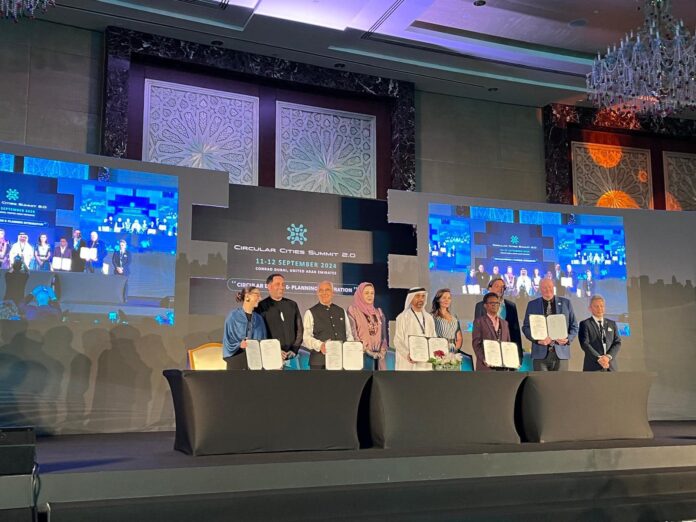AIPH met with leaders of the founding organisations at the Circular Cities Summit 2.0 in Dubai to sign a Memorandum of Understanding (MOU) to advance sustainable urban development globally.
The Circular Cities Summit 2.0, held from September 11-12, 2024, in Dubai, marked another significant milestone in advancing sustainable urban development globally. AIPH Vice President Bill Hardy joined leaders from the eight founding organisations to commit to collectively and collaboratively foster the development of circular cities worldwide.
AIPH’s involvement in Circular Cities Summit 1.0 in Singapore in 2023 laid the groundwork for the shared intention to create resilient, circular urban spaces. The summit brought horticulture to the forefront of discussions, establishing its importance in sustainable city planning. This year, Circular Cities Summit 2.0 expanded the dialogue by convening experts from over 25 countries to address key environmental challenges, such as climate resilience, urban health, and circular design principles.
The MOU signed during the event formalised the collaboration between the eight founding organisations to promote cities that reduce waste, enhance resource efficiency, and foster sustainable growth. These founding organisations are:
- International Association of Horticultural Producers (AIPH)
- International Federation of Landscape Architects (IFLA)
- International Society for Urban Health (ISUH)
- International Society of City and Regional Planners (ISOCARP)
- International Union of Architects (UIA)
- Society of Sustainability and Green Materials (SSGM)
- World Federation of Engineering Organizations (WFEO)
- World Green Infrastructure Network (WGIN)

“Collaborating for a Sustainable Future”
Bill Hardy expressed the significance of this collaboration, stating, “This MOU is a powerful step forward for AIPH and all founding partners. Together, we will push the boundaries of circular urban development, focusing on creating cities where sustainability is at the forefront of planning and development.”
Dr Audrey Timm, AIPH Technical Initiatives Manager, added: “Horticulture is a vital component of future city development. Working together with experts from various fields, we can collectively create cities that are more resilient and adaptive to change.”
About Circular Cities Summit 2.0
Cities have an important role in the transition to a circular economy. The Circular Cities Summit 2.0 explored how urban professions can collectively and individually contribute to addressing the core issues of circularity in eliminating waste and pollution, enhancing resource efficiency, and regenerating nature. Attendees engaged in critical conversations about nature within urban spaces and the importance of integrating natural and engineered solutions for infrastructure to ensure the longevity of modern cities.
A Collaborative Network for Global Impact
A key outcome of Circular Cities Summit 2.0 is the intention to establish a Circular Cities Network that unites global professionals dedicated to the future of sustainable urban development. Through knowledge-sharing and collaboration, the Network aims to drive innovation and resilience in cities worldwide, ensuring they adopt and implement principles of circularity.







